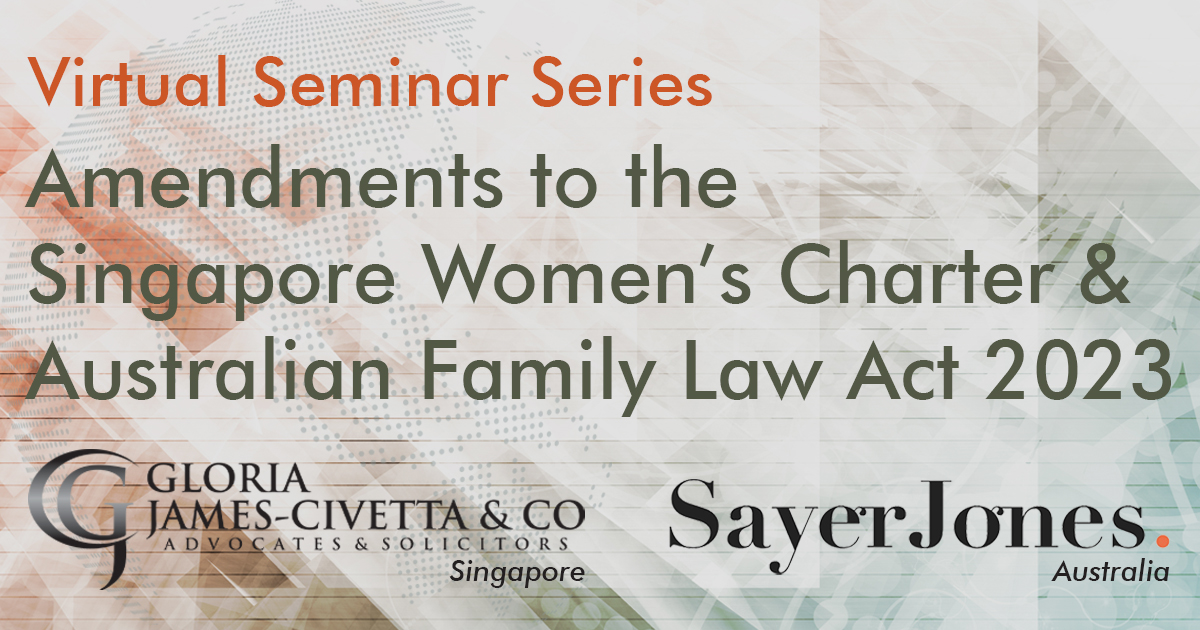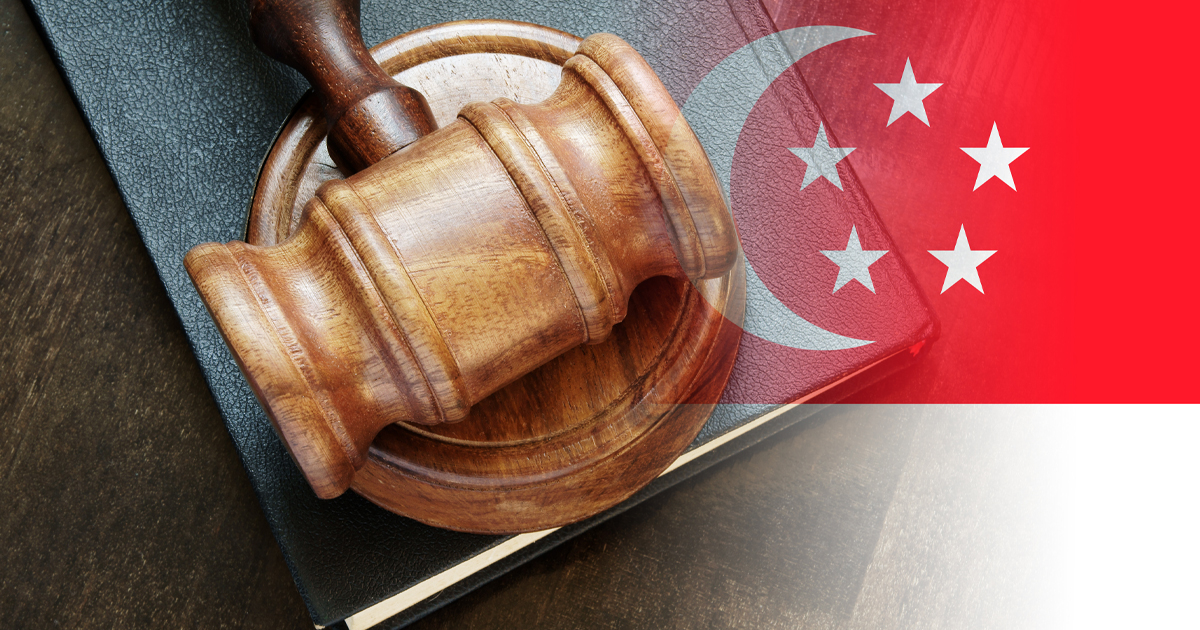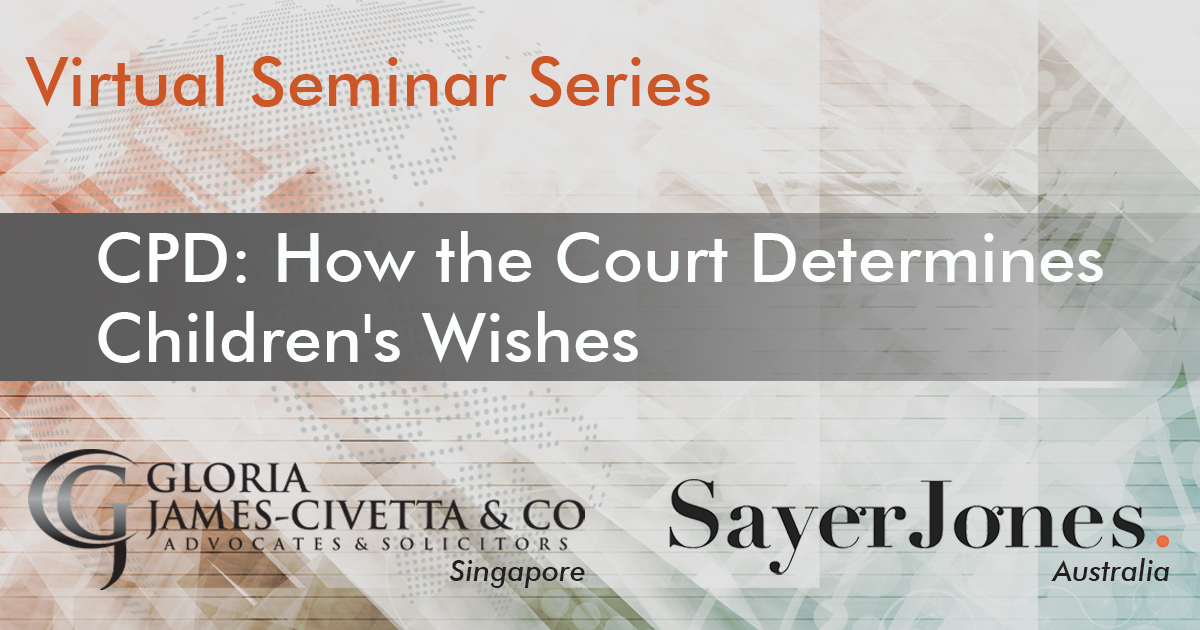By Sara Aziz and Elyse Wright
Amendments to the Singapore Women’s Charter
CPD Session in Sepetember 2023
- Divorce by mutual agreement
- Enforcement of maintenance orders
- Enforcement of custody / access order
CPD Session Today
- Family violence
New Laws to Protect Victims of Family Violence
On 4 July 2023, amendments to the WC were passed to strengthen protection for victims of family violence and to facilitate better rehabilitation of the offenders.
- Definition of “family violence”
- Types of orders
- Enhanced powers given to the “Protectors”
- Enhanced penalties given to the offenders
Updated Definition as per New Amendment
Previously, “family violence” only referred to physical abuse. Under the new law, “family violence” refers to physical, sexual, emotional and psychological abuse.
Physical Abuse
- Includes conduct or behaviour that-
- causes, or threatens to cause, personal injury or physical pain to a person: or
- threatens a person with the death or injury of the person; and
- also includes wrongfully confining or restraining a person against the person’s will; but
- Causing or threatening to cause personal injury or physical pain to someone
- Or threatening them with death or injury
Illustration
Person X who smashes furniture in the house, thereby causing the spouse to be in fear of personal injury, can be said to have committed physical abuse against the spouse. Physical abuse also includes wrongfully confining or restraining someone against their will.
Sexual Abuse
“Sexual abuse” includes conduct or behaviour that coerces, or attempts to coerce, a person to engage in sexual activity.
Illustration
Offender forcing their spouse to engage in sexual intercourse with them against their will by threatening violence if the spouse refuses to comply.
Emotional or Psychological Abuse
“Emotional or psychological abuse” means conduct or behaviour that —
- torments, intimidates, harasses or distresses a person; or
- causes or may reasonably be expected to cause mental harm to a person, including thoughts of suicide or inflicting self-harm.
Illustration
- X who spreads false rumours about their spouse being promiscuous. Spouse finds out and is distressed.
- X makes demeaning comments to belittle and/or humiliate spouse in front of children. X threatens to stop giving spouse monthly allowance if spouse contacts her family. As a result, spouse suffers mental harm.
- X constantly calling spouse to check on whereabouts / isolating spouse / not allowing spouse to leave house
Types of Orders Granted
| Currently | Changes – Additional Orders |
|---|---|
| Personal Protection Order (“PPO”) | Expansion of scope of counselling order |
| Domestic Exclusion Order | Stay Away Order |
| Counselling Order | No Contact Order |
Expansion of Scope of Counselling Order
- Includes other programmes
- Treatments & interventions e.g. parenting programmes, caregiver training, family therapy
- Mandatory treatment orders against the offender
- Where offender has psychiatric condition that is likely to be a contributing factor towards family violence
- Study found that about 14% of those who had PPO applications against them had been diagnosed with mental health conditions earlier
- Court now has powers to grant mandatory treatment orders for the offender to receive up to 36 months of treatment, which may include requirement to reside in psychiatric institution or a place providing psychiatric treatment
- Counselling orders and mandatory treatment orders will now survive the PPO
New Orders
- Applies in situations where the offenders continue to harass the survivors outside their homes
- Strengthens legal protection
Stay Away Order
- Prohibits the offender from entering or remaining in locations frequented by the survivor
- Examples can include: survivor’s workplace and/or the school which the survivor has enrolled their child
No Contact Order
- Prevents the offender from communicating with the victim
Enhanced powers given to “Protectors”
- “Protectors” – newly introduced – people with suitable qualifications & experience, appointed by the Ministry of Social and Family Development’s (MSF) Director-General of Social Welfare
- Protectors can intervene in certain circumstances
- They have powers to enter premises
- They can issue Emergency Orders on site, in high-risk cases
- Takes effect immediately and is valid for 14 days to give the survivor time to apply for a PPO
- Protectors can apply for electronic monitoring / e-tagging to be used against high-risk offenders
- Instances where offender has breached a family violence court order & caused harm and where the survivor has not taken steps to protect himself or herself
Removal of survivors from their homes
- Protectors may apply to Court for the removal of a survivor from their home as a measure of last resort
- Known as a Removal Order
- The Court must also make a Care Order, a Supervision Order, or both, alongside a Removal Order
- Care Order
- Commits the survivor to the care of a fit person, which could include a competent individual or organisation, for a specified period of time.
- Supervision Order
- Places the survivor under the supervision of a Protector or another suitable court-appointed person for a specified period of time
Following removal from the home, survivor may be placed in a residential facility such as a crisis shelter. Court may also make an order prohibiting the survivor from returning home or having any contact with the offender.
Enhanced penalties against the offenders
- Penalties have been increased
- Maximum fine for breaching a family violence-related court order will be increased from $2,000 to $10,000
- Maximum imprisonment term will be increased from 6 months to 12 months
- Breaches of Counselling Orders and Mandatory Treatment Orders are considered offences that could subject the offender to a fine of up to $2,000.
- Additionally, offenders who are guilty of aggravated offence will be liable of up to $10,000, imprisonment of up to 18 months, or both.
- Family violence offence is aggravated if the offender has contravened an order protecting a vulnerable adult (i.e. individuals suffering from mental or physical disabilities)
Other amendments
- Younger survivors can now apply (between 18 to 21 years old) without having to rely on any guardian to apply for them
- Younger survivors no longer need to be represented and can act for themselves
- For children & vulnerable adults (i.e. individuals suffering from mental or physical disabilities), the MSF has statutory powers to provide protection to these groups.
Moving forward
- Empowerment!
- Better protection to survivors
- Deter and rehabilitate offenders
- Law continues to evolve – financial abuse perhaps? New Domestic Violence Act?
Australian Family Law Amendment Bill 2023
The Main Changes
- Removal of the presumption of equal shared parental responsibility and related equal time and substantial and significant time provisions.
- Codification of the common law rule established in Rice and Asplund.
- Changes to how a court determines what is in a child’s best interests (Section 60CC).
- Amendment to the definitions related to the concept of family to be more inclusive of First Nations persons culture and traditions.
- Codification of a requirement for ICL’s to meet with the child and give the child an opportunity to express a view.
- Introduction of harmful proceedings order to prevent vexatious litigants.
- Introduction of a new power to make regulations that provide standards and requirements to be met by family report writers.
- Minor administrative amendments to the Federal Circuit and Family Court of Australia (Family Law) Rules 2021 (Cth).
Repeal to the Presumption of Equal Shared Parental Responsibility and the Consideration of Equal Time and Significant and Substantial Time Provisions
Amendments to Section 60CC of the Family Law Act 1975 (Cth) (Exposure Draft)
General Consideration
For the purposes of paragraph (1)(a), the court must consider the following matters
- what arrangements whould best promote the safety (including safety from family violence, abuse, neglect, or other harm of:
- the child; and
- each person who has parental respinsibility for the child (the Carer);
- any views expressed by the child;
- the developmental, psychological and emotional needs of the child;
- the capacity of each proposed carer to provide for the child’s developmental, psychological and emotional needs, having regard to the carer’s ability and willingness to seek support to assist them with caring;
- the benefit to the child of being able to maintain a relationship with both of the child’s parents, and other perople who are significant to the child, where it is safe to do so;
- anything else that is relevant to the particular circumstances of the child.
Additional Considerations-right to engoy Aboriginal or Torres Strait Islander culture
- For the purposes of paragraphs (1)(b), the court must consider the following matters:
- the child’s right to enjoy the child’s Aboriginal or Torres Strait Islander culture, by having the opportunity to connect with, and maintain their connection with, their family, community, culture, country and language;
- the likely impact any proposed parenting order under this Part will have on that right.
Consent Orders
If the court is considering whether to make an order with the consent of all the parties to the proceedings, the court may, but is not required to, have regard to all or any of the matters set out in subsection (2) or (3).
Submission
National Women’s Safety Alliance
Supportive of the bill but notes underlying concerns.
S60CC(5): “the benefit to the child of having a meaningful relationship with both of the child’s parents, where it is safe to do so”
“it relies on the subjectivity of presiding officers wo, without adequate understanding of the dynamics of domestic and family violence and child sexual abuse, may downplay forms of abuse, such as coercive behaviours that can only be fully understood in the context of a given relationship”
Aboriginal Legal Rights Movement Inc
Supportive of the bill but notes underlying concerns.
The consideration of Aboriginal and Torres Strait Islander culture may be interpreted is just “additional”.
Dads for Kids
Not supportive.
“the ideology behind the Family Law Amendment Bill 2023 appears to be based on father-phobic, radical feminist ideology that is now entirely outdated and unsupported even by modern family-friendly feminists”
Conclusion:
In my view, the changes made to the Family Law Act are necessary and generally positive, however I do acknowledge that these changes do present further issues in terms of potential misinterpretation and that if misinterpreted, it could act against the best interests of the child.











